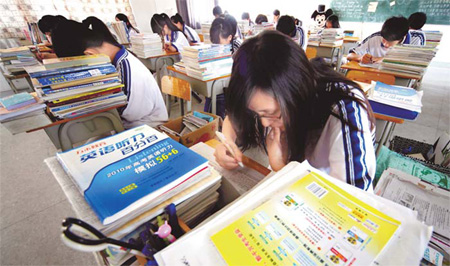Testing year ahead as key exam looms
Second chances
Compared to those in the cities, parents in rural areas rely even more on the gaokao to give their children a chance to change their destiny, say experts.
 |
|
Pupils surrounded by textbooks prepare at Yinghua Foreign Languages School in Shantou, Guangdong province. |
Yang Lei, who sat the gaokao in the summer of 2009, grew up in Guangfeng, a poor county in North China's Shanxi province, and was determined throughout school that he would change his family's fortunes.
"My home is the poorest in this village," he said. "Most of our neighbors have homes built with bricks but we still live in a stone house."
Yet, the youngster's dream of winning a place at a prestigious university suffered a serious setback when he failed to attain the score he wanted in the college entrance exam.
When this happens, children, particularly those from the countryside, have only a few options, with the main ones being: Get a job or fudu, re-sit the last year of high school.
Large numbers of students nationwide opt to fudu every year for another shot at higher education. According to the Ministry of Education, 26 percent of the 10.2 million who sat the gaokao in 2009 were fudu students.
Yang, 18, prepared to take his second gaokao at a popular school in Linchuan, a city in Jiangxi province, and studied until roughly 2 am every night.
"I always had a book in my pocket," he said. "Even while I was waiting in line in the canteen I was studying."
He explained he spent just 160 yuan (US$24) a month on food, which is his only expense as tuition and accommodation are free due to his good academic record. "My parents live on scant food at home, so I can't indulge myself with meat and fish in the school canteen," he said.
After acing this year's college entrance exam, Yang finally realized his dream and was accepted into Peking University's center for health science to study clinical medicine.
"As a doctor I will be able to give my parents a wonderful life," he added.
 0
0 






